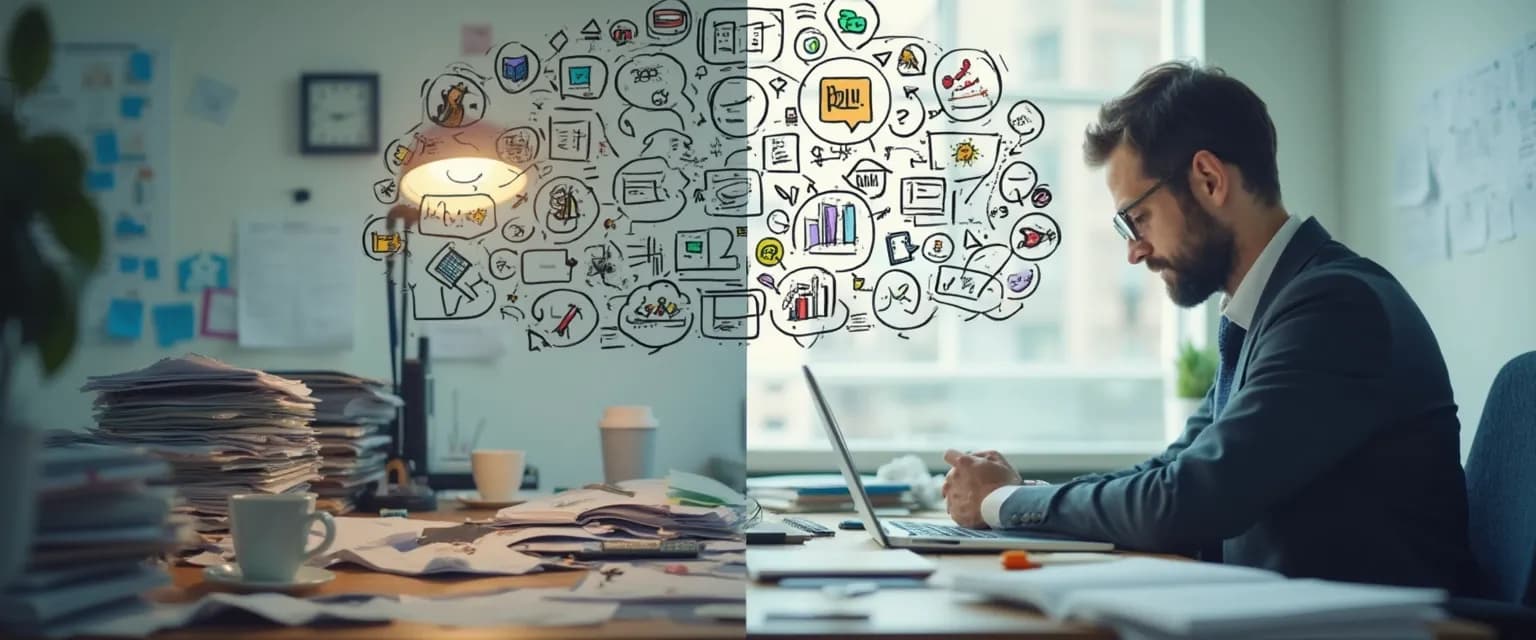Declutter Your Mind vs. Physical Space: Which Affects Productivity More?
Ever notice how a messy desk and a racing mind both leave you feeling scattered? The battle between physical clutter and mental chaos is real, and both compete for your precious attention. When you declutter your mind, you're not just creating mental space—you're unlocking your productivity potential. But which form of disorganization is the real productivity killer? Let's dive into the invisible weight of mental clutter versus the visible burden of physical mess.
The science is clear: both types of clutter tax your brain's processing power. However, mental clutter operates like background apps draining your phone's battery—even when you're not actively thinking about those unfinished tasks or lingering worries. Learning to effectively manage task-switching becomes essential when your mind is overloaded. Research from Princeton Neuroscience Institute confirms that physical clutter competes for your attention, but mental clutter actually limits your brain's processing capacity.
The question isn't whether clutter affects productivity—it's which type has the greater impact and how to declutter your mind for maximum performance. The answer might surprise you.
How to Declutter Your Mind for Maximum Productivity
Mental clutter creates a unique productivity drain because it's always with you. Unlike physical mess that you can walk away from, the thoughts bouncing around your head follow you everywhere. Neuroscience reveals that this constant mental static significantly impairs your prefrontal cortex—the brain region responsible for focus, decision-making, and prioritization.
How do you know it's time to declutter your mind? Watch for these warning signs: difficulty making simple decisions, forgetting important details, feeling overwhelmed by routine tasks, or experiencing racing thoughts that won't quiet down. These cognitive symptoms indicate your mental space needs attention.
Fortunately, effective declutter your mind techniques don't require hours of meditation. Try this 60-second reset: close your eyes, take three deep breaths, and mentally name three things you can hear, two things you can feel, and one thing you're certain about. This quick grounding exercise interrupts the mental chaos cycle and reduces overwhelming thoughts that steal your focus.
Another powerful strategy is the "brain dump"—spend two minutes listing everything occupying your thoughts. This simple act transfers those swirling thoughts from your mind onto paper, creating immediate mental space. The key to these declutter your mind tips is consistency—small, regular mental clearing practices yield remarkable productivity gains.
Physical Clutter vs. Mental Clutter: The Productivity Showdown
When researchers at Harvard directly compared the productivity impact of physical versus mental clutter, they found something fascinating: while physical mess reduced productivity by an average of 15%, mental clutter slashed performance by nearly 33%—more than twice the impact!
The explanation? Physical clutter remains stationary, affecting you only when you're in that environment. Mental clutter, however, travels with you, continuously draining cognitive resources. This makes declutter your mind strategies particularly valuable for productivity enhancement.
Interestingly, personality plays a role in which type affects you more. Visual processors report greater distraction from physical disorganization, while analytical thinkers struggle more with mental clutter. The most surprising finding is how interconnected these two forms are—a decluttered physical space often leads to improved mental clarity and vice versa.
The good news? Mental clutter, despite its greater impact, responds more quickly to intervention. While organizing a cluttered office might take hours, you can significantly declutter your mind in minutes with the right techniques.
Your Personal Declutter Your Mind Action Plan
Ready to boost your productivity by tackling both types of clutter? Start with these tailored strategies:
- For mental clutter: Schedule three 2-minute "mind clearing" breaks throughout your day
- For physical clutter: Identify your "high-impact zone" (the one area where mess most affects your focus) and organize just that space
- For digital clutter: Close unused browser tabs and apps that aren't immediately relevant
The compound effect of addressing both types simultaneously creates a productivity multiplier effect. Remember that learning to declutter your mind isn't a one-time event but a daily practice that builds your mental clarity muscles over time.
By implementing these declutter your mind strategies consistently, you'll experience the remarkable productivity boost that comes from having both a clear environment and a focused mind. The verdict in the productivity showdown? Mental clutter wins as the bigger productivity thief—but with these techniques, you now have the tools to reclaim your cognitive space.




